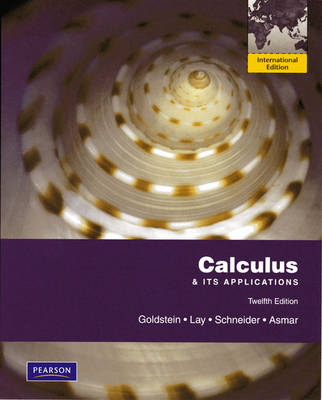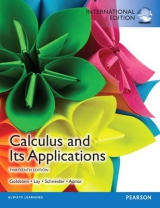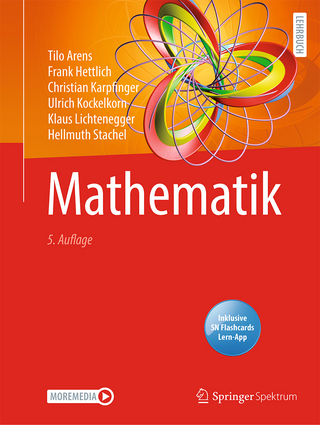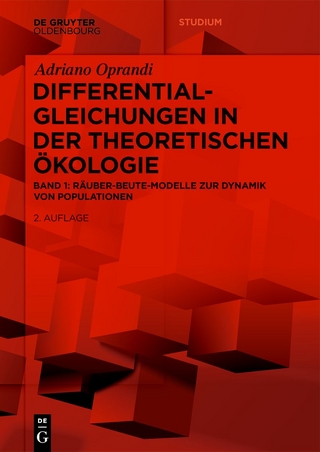
Calculus and Its Applications
Pearson (Verlag)
978-0-321-63944-8 (ISBN)
- Titel erscheint in neuer Auflage
- Artikel merken
Larry Goldstein has received several distinguished teaching awards, given more than fifty Conference and Colloquium talks & addresses, and written more than fifty books in math and computer programming. He received his PhD at Princeton and his BA and MA at the University of Pennsylvania. He also teaches part time at Drexel University. David Schneider, who is known widely for his tutorial software, holds a BA degree from Oberlin College and a PhD from MIT. He is currently an associate professor of mathematics at the University of Maryland. He has authored eight widely used math texts, fourteen highly acclaimed computer books, and three widely used mathematics software packages. He has also produced instructional videotapes at both the University of Maryland and the BBC. David C. Lay holds a BA from Aurora University (Illinois), and an MA and PhD from the University of California at Los Angeles. Lay has been an educator and research mathematician since 1966, mostly at the University of Maryland—College Park. He has also served as visiting professor at the University of Amsterdam, the Free University in Amsterdam, and the University of Kaiserslautern in Germany. He has published more than thirty research articles in functional analysis and linear algebra. Nakhle H. Asmar received his PhD in mathematics from the University of Washington in 1986. After spending two years on the faculty at California State University—Long Beach, he joined the University of Missouri—Columbia in 1988, where he is currently Professor of Mathematics. He has received several teaching awards from the University of Missouri, including the William T. Kemper Fellowship Award, the Arts and Science Student Government Purple Chalk Award, and the Provost’s Outstanding Junior Faculty Teaching Award.
0. Functions
0.1 Functions and Their Graphs
0.2 Some Important Functions
0.3 The Algebra of Functions
0.4 Zeros of Functions-The Quadratic Formula and Factoring
0.5 Exponents and Power Functions
0.6 Functions and Graphs in Applications
1. The Derivative
1.1 The Slope of a Straight Line
1.2 The Slope of a Curve at a Point
1.3 The Derivative
1.4 Limits and the Derivative
1.5 Differentiability and Continuity
1.6 Some Rules for Differentiation
1.7 More About Derivatives
1.8 The Derivative as a Rate of Change
2. Applications of the Derivative
2.1 Describing Graphs of Functions
2.2 The First and Second Derivative Rules
2.3 The First and Second Derivative Tests and Curve Sketching
2.4 Curve Sketching (Conclusion)
2.5 Optimization Problems
2.6 Further Optimization Problems
2.7 Applications of Derivatives to Business and Economics
3. Techniques of Differentiation
3.1 The Product and Quotient Rules
3.2 The Chain Rule and the General Power Rule
3.3 Implicit Differentiation and Related Rates
4. Logarithm Functions
4.1 Exponential Functions
4.2 The Exponential Function ex
4.3 Differentiation of Exponential Functions
4.4 The Natural Logarithm Function
4.5 The Derivative of ln x
4.6 Properties of the Natural Logarithm Function
5. Applications of the Exponential and Natural Logarithm Functions
5.1 Exponential Growth and Decay
5.2 Compound Interest
5.3 Applications of the Natural Logarithm Function to Economics
5.4 Further Exponential Models
6. The Definite Integral
6.1 Antidifferentiation
6.2 Areas and Riemann Sums
6.3 Definite Integrals and the Fundamental Theorem
6.4 Areas in the xy-Plane
6.5 Applications of the Definite Integral
7. Functions of Several Variables
7.1 Examples of Functions of Several Variables
7.2 Partial Derivatives
7.3 Maxima and Minima of Functions of Several Variables
7.4 Lagrange Multipliers and Constrained Optimization
7.5 The Method of Least Squares
7.6 Double Integrals
8. The Trigonometric Functions
8.1 Radian Measure of Angles
8.2 The Sine and the Cosine
8.3 Differentiation and Integration of sin t and cos t
8.4 The Tangent and Other Trigonometric Functions
9. Techniques of Integration
9.1 Integration by Substitution
9.2 Integration by Parts
9.3 Evaluation of Definite Integrals
9.4 Approximation of Definite Integrals
9.5 Some Applications of the Integral
9.6 Improper Integrals
10. Differential Equations
10.1 Solutions of Differential Equations
10.2 Separation of Variables
10.3 First-Order Linear Differential Equations
10.4 Applications of First-Order Linear Differential Equations
10.5 Graphing Solutions of Differential Equations
10.6 Applications of Differential Equations
10.7 Numerical Solution of Differential Equations
11. Taylor Polynomials and Infinite Series
11.1 Taylor Polynomials
11.2 The Newton-Raphson Algorithm
11.3 Infinite Series
11.4 Series with Positive Terms
11.5 Taylor Series
12. Probability and Calculus
12.1 Discrete Random Variables
12.2 Continuous Random Variables
12.3 Expected Value and Variance
12.4 Exponential and Normal Random Variables
12.5 Poisson and Geometric Random Variables
| Erscheint lt. Verlag | 9.4.2009 |
|---|---|
| Sprache | englisch |
| Maße | 204 x 254 mm |
| Gewicht | 1160 g |
| Themenwelt | Mathematik / Informatik ► Mathematik ► Analysis |
| ISBN-10 | 0-321-63944-8 / 0321639448 |
| ISBN-13 | 978-0-321-63944-8 / 9780321639448 |
| Zustand | Neuware |
| Informationen gemäß Produktsicherheitsverordnung (GPSR) | |
| Haben Sie eine Frage zum Produkt? |
aus dem Bereich



